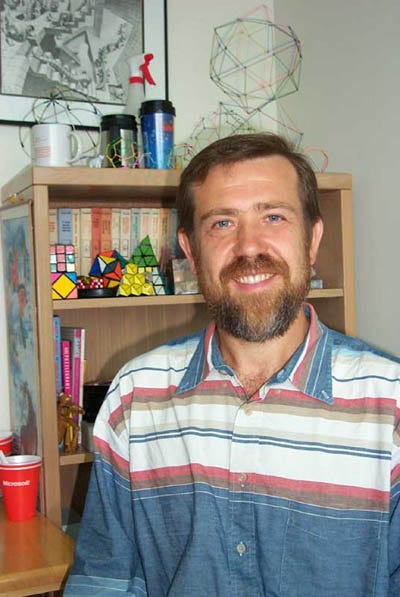Catching Up Casually: A Chat With Alexey Pajitnov
In this in-depth interview, Gamasutra sits down with legendary Tetris creator Alexey Pajitnov to discuss the state of the casual game market, a form he helped to birth - as well as his current game projects and the storied history of Tetris.

When Gamasutra attended the GameCity conference in Nottingham, England late last year, we encountered a series of intriguing presentations, films and demonstrations centering around games, and presented in a film festival-esque format.
While there, we also got the chance to speak with some of the key speakers at the conference -- including Alexey Pajitnov, creator of Tetris, who was there to participate in a Q&A session following the presentation of the documentary Tetris: From Russia with Love. We engaged him to discuss the state of the casual game market, a form he helped to birth, as well as his current game projects and the storied history of Tetris.
Katamari Damacy creator Keita Takahashi was also speaking here yesterday - have you played Katamari?
Alexey Pajitnov: No. Is it the one with one ball or different balls? I'm mixing a few together. At GDC it was snowballs, where you pick snowballs of different colours -- I know which one you mean -- I've seen it at Game Developers Conference and I really enjoyed it. The features were little bit overwhelming.
One of the things he mentioned is that he's essentially sick of talking about Katamari. Are you ever tired of talking about Tetris?
AP: Not really, because every time it's different people and different questions. And I consider it a part of my mission.
You think of it as a mission?
AP: [Laughs] Yes, I don't mind it at all.
 What's your impression of the casual games market these days?
What's your impression of the casual games market these days?
AP: It's growing and finally becoming mature. The installed base has become huge, people have stopped considering the computer just a boring tool, and come to understand that this is a powerful machine for entertainment as well.
Do you feel it's too crowded?
AP: The markets are crowded, but that's the property of the market. A healthy market must be crowded. [Laughs.]
How did Dwice fare?
AP: Frankly, I don't know. They sell it in Kmart or somewhere.
There's retail distribution now, not just online?
AP: No, they have some part of the retail market. [pauses]
I never thought it would be some kind of great game, but it's another small piece of entertainment. It has a deepness to it. Have you tried it on level seven when you have two starters? It's kind of funny.
Are you still developing games for WildSnake?
AP: Yes, we're planning to do something two-player, that's our very last idea. We still don't know what it will be. They've worked on another good game called Chipai or Chapai. It's an incarnation of our childhood game from when we were small boys and didn't know how to play checkers.
We'd put the pieces in a row and just flick them, and try to knock out the other person's entire row. It was very popular, it had a very strong rule set that you start with, about movement and combinations. So they took that and have a very good version of it.
Did you help design that?
AP: No, they did it on their own, but they inspired me -- this is a really great area to do something creative, because you can play with the field, you can play with the pieces, with their properties. So I'm trying to convince them to do another, more advanced, version of this.
Are you still actively designing?
AP: Not really actively, but as soon as we agree to do it, I will write them a spec. It's very convenient to work with them because they understand everything very well and there are no formalities. We discuss things briefly and they immediately try to realize it.
What is most of your day-to-day work now? Is it overseeing Tetris Holdings?
AP: No, that doesn't take too much time. I basically enjoy myself.
Are you essentially retired?
AP: I can't say that I have a working day or working hours. I think I should probably start something with Microsoft, because we have a very good general agreement and they are ready to do something with me. They have a team of prototypers ready and now, finally, they have some kind of good sense of what to do in this area.
Have you seen the [Tetris-related] film they're going to show later? What do you think of it?
AP: Well, it's good for a movie. There were a number of movies about this story, this is one of them, and I think it's good. Frankly, there was another movie made just before Magnus [Temple, director] did this one, so I'm a little mixed up. But people enjoy watching. I can't be objective because I'm part of this story.
I noticed that any time they flash back in time to when you were working for the Soviet Institute, the music gets very... heavy-handed.
AP: [Laughs.] Well, that's how they make drama in movies. They need a soundtrack like that. And the building itself is depressing enough! But they have good interviews there with everybody and it seems like a good job.
Did you feel any of that heavy drama when it was actually happening?
AP: Well, everything in the movie is very concentrated. All the events have a duration of years. There were very sharp moments, but it wasn't like an action movie. [Laughs.]
There seems to be a general perception, especially in America, that you were dealt a bad hand with all of the business decisions that were made, that you were possibly taken advantage of.
AP: [Laughs.] Basically, it's very good to say it afterwards, but when you're in the real situation, in front of real choices, sometimes it's a much harder decision. You don't know how your life will turn out. You don't know how the life of your country will turn out.
At the time I needed to make that decision, the Soviet Union and all of its legal situations were very gray, very unclear.
In reality, either I started to fight with everybody around me, the computer center, the Soviet Union, the KGB, and spend the rest of my life fighting, or I get everybody into one team and make it happen as a game.
So I decided I'm not a fighter, I'm a designer, and I never complained about my decision.
You seem to harbor no resentments.
AP: Yes, because first of all, I did what I wanted: the game became an event, and that was the most important thing. Second, in ten years the rights came back to me. It was not awfully great money, but it's still OK, and I'm very happy with what I'm still getting. So, again, I might have been several million richer, but would I have been several million happier? I'm not sure. I'm not sure about that.
So you have no regrets?
AP: Oh, no. No regrets at all. No regrets at all. I think all the Tetris part of my life is great. Everything happened exactly as it's supposed to happen. [Pauses and smiles.] And maybe it was me that took advantage.
How so?
AP: Because of the political situation. People have said that part of the initial popularity of Tetris was the popularity of Russia and the cathedrals on the box. Of course it helps, but it's part of my life. It's not me who invented this stuff.
But, on the other side, the popularity of Tetris came from the Game Boy, and Tetris was bundled with it. If you remember the first Game Boy, it was a very boring dull grey box with no cathedrals on it, so, basically, everything is kind of questionable.

What do you want to do from here?
AP: Well, I'm pretty happy with what I have now. I'm well set up in Seattle. I spend substantial time in Moscow, spending time in my cultural environment, which I enjoy. I have some groups that like to work with me, so I can do some design.
That's the challenge for me: can I get some kind of result without really hard, active involvement? It seems to be that it's possible. I finished Hexic, and Hexic is a really good game, I enjoyed it. I finished another small game in Moscow, just for an advertisement.
Which was that?
AP: I call it Facial Constructor. I did it for a company that created face technology for the internet.
Unfortunately, the technology seems to be gone, and the team is gone. Disbanded. But, I needed to finish my job, and I did. I finished the game. Probably it will be forgotten about in a couple of weeks. [Laughs.]
Are you still an active gamer yourself?
AP: I do play games. From time to time I try to look at my to-do list. I have a long to-do list in terms of the concepts. Once I'd wanted to do a certain game but something stopped me -- it's time to come back to this concept and try to realize it.
I think the time has come for two-player games. I've always had lots of ideas for that but they were never realized because it was always a pain in the neck with the networking and whatever.
Now it's such a simple thing. The messengers can take most of the problem, you just place the game on top of it and there it is. Two-player games are a very rich area and there are lots of things that might be done.
Are you mostly interested in competitive games or cooperative two-player?
AP: That's another thing -- usually cooperative thinkers are much more creative and interesting and constructive, but competitive play is much more motivational. If you put together competitive and cooperative, then cooperative will lose, but it's still a challenge to come up with a very good cooperative game. It should be very asymmetric. I'm fine with it.
If one player is good with a certain kind of feature, and the other with another set of features, then cooperation makes sense. If they both do the same thing, then they'd better compete.
But everybody doesn't feel comfortable with this kind of asymmetric set up, they might feel discriminated or something like that. So that's the other stuff that I want to work on at some point.
Are you going to continue to focus on consoles? Are you happy with how they're evolving?
AP: Normally when I have the concept, I don't think about the platform. If I'll work for Microsoft, I'll definitely keep in mind the Xbox, because that's what they're interested in.
Would you be interested in working on the Wii?
AP: If I had an idea, I would approach them, but it doesn't seem that I do at this point. I honestly haven't played it that much, I've only tried it a handful of times.
Read more about:
FeaturesAbout the Author(s)
You May Also Like







.jpeg?width=700&auto=webp&quality=80&disable=upscale)








